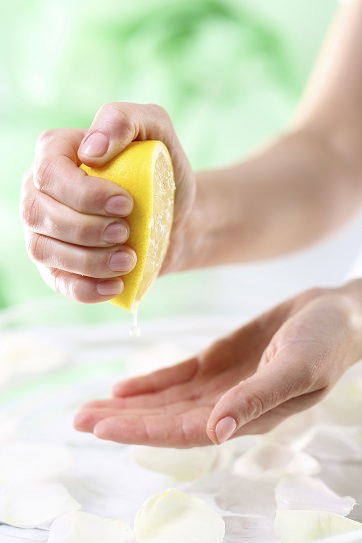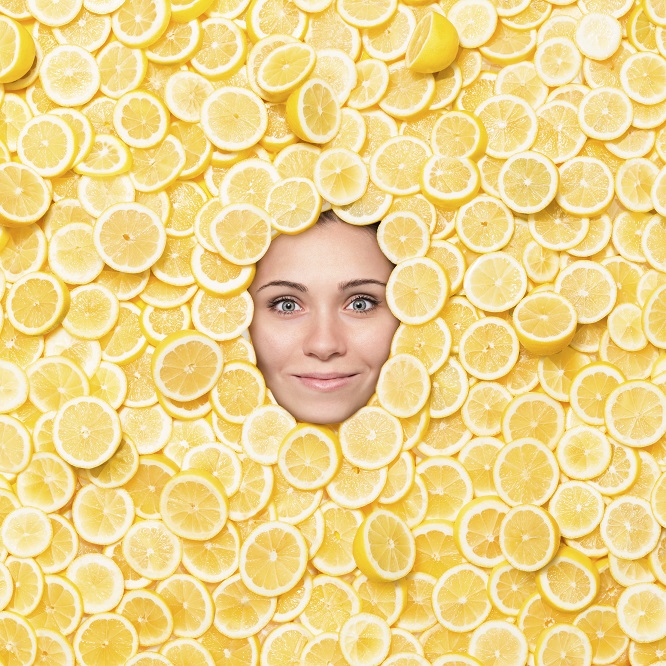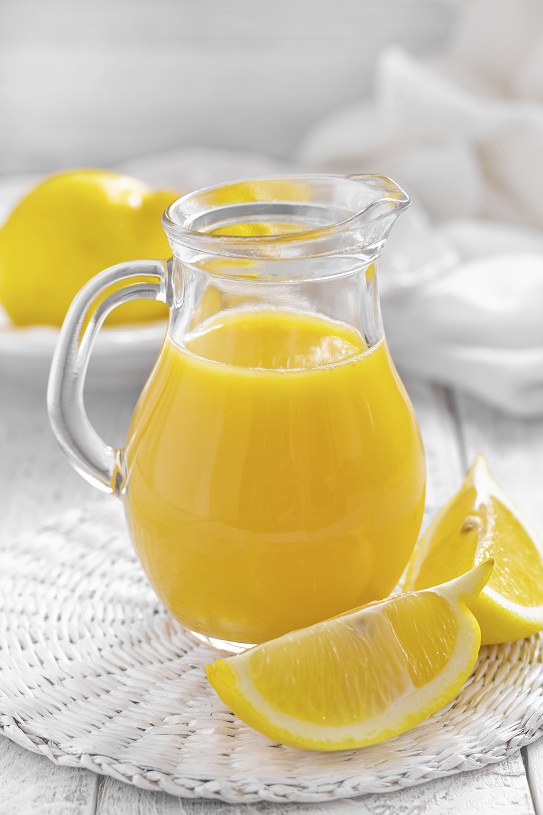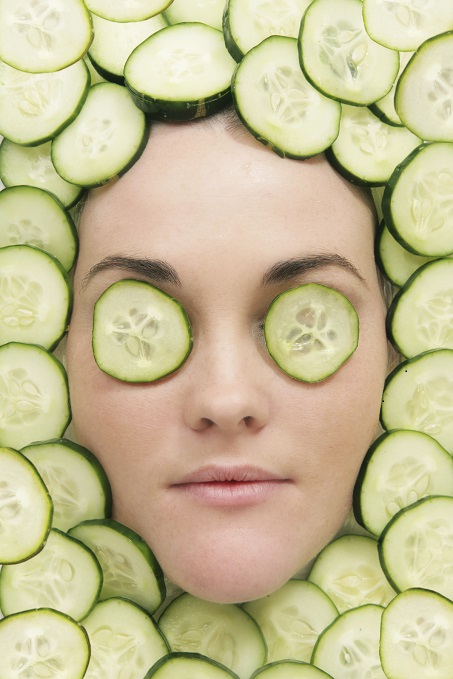
Home remedies can be a treacherous group to explore for an acne sufferer. You have the likes of toothpaste, said to dry angry pimples out superbly, but actually full of inflammatory chemicals. You have baking soda masks, an old favourite for acne which is actually way too alkaline for healthy skin.
But then you have things like pomegranate. I long claimed that its compounds would be beneficial when applied topically, and it’s now official according to this study.
With this group you’re in the dark, relying on your own wits, but it’s possible to stumble across something amazing…
…and if you believe everything you read on the internet, lemon juice is one of those amazing homemade acne treatments. The liquid squeezed straight from a fresh lemon is among other vague claims, said to 1) fade away acne scars, 2) wipe out acne bacteria, and 3) put an end to oily skin.
But is lemon juice really an effective and above all cheap acne remedy? The answer is no.
Lemon juice can wreck photosensitising havoc
 Firstly, lemons and the juice they contain are potent sensitizers of human skin to ultraviolet light.
Firstly, lemons and the juice they contain are potent sensitizers of human skin to ultraviolet light.
Lemons as well as some other citrus fruits are rich in compounds known as furocoumarins. One of them, called psolaren, has fascinating properties. It’s completely safe to apply to the skin… in darkness that is.
However, when psoralen is exposed to UV radiation, its electrons absorb the sun-derived energy and the compound swells up to 3 times its normal size. Eventually, the psoralen molecules release all this stored energy, in an intense burst of heat and radiation.
The result of this explosion to your naked eye is a red rash, or other forms of inflammation.
The burst of energy is strong enough to kill off skin cells on your upper layers, and cause deadly DNA mutations. What’s more, lemon juice is notorious for increasing sunlight sensitivity. Symptoms can be burning, irritation, blistering, itching, and worst of all, added inflammation to existing acne and pimples.
Read Annihilate Your Acne – get the diet that could transform your skin!
Another common result is the much-feared hyperpigmentation, a discolouring of patches of skin. Lemon juice is actually touted by many as a skin lightener, including for old acne scars. But the mutating effects of psolaren can warp your skin colour even further if you apply it with anything less than expert precision.
Hyperpigmentation is reversible, but occasionally permanent. Consider permanent sunburn marks. Have you ever had sunburn so bad on the beach one day that ten years later, you still have dark patches dots all over your back? Or the reverse – occasionally you get white spots in former sunburn patches?
The threat of hyperpigmentation is real and lemon juice can cause it.
Lemon juice – a great source of burning acid
 The furocoumarins aren’t the only danger to your skin’s integrity – the high acidity of lemon juice is another risk factor.
The furocoumarins aren’t the only danger to your skin’s integrity – the high acidity of lemon juice is another risk factor.
On this website I’ve previously criticised alkaline acne treatments like baking soda and bentonite clay, which are promoted as “healing”. While your body has a roughly neutral PH, your skin is designed to be acidic.
Your skin’s acid mantle is vital for preventing the overgrowth of pathogenic bacteria, including acne bacteria, and providing a firewall against infection, incinerating them like a comet is incinerated by the earth’s atmosphere.
Next – the 6 best vitamins and minerals for naturally clear skin
Applying super alkaline remedies results in skin irritation and weakens overall skin barrier function. However, so does too much acidity…
…and that’s what lemon juice causes. Human skin has a PH of 4-4.5, lemon juice has an average PH of 2.5.
There’s nearly 50 commercial grown species of lemon in the world. 3 of the most common ones are the Meyer, Eureka, and Lisbon. Like any fruit, different varieties vary in their nutritional composition, and the PH is no exception, but the rough range for lemons is nevertheless 2-3.
Just try the drinking game where you chuck a whole lemon into your mouth, chew and suck the whole fruit dry of its edible contents, and then spit out the bare bones skin again. You’ll feel like you swallowed a bottle of sulphuric acid. Your teeth will feel dry and stripped down right to the raw calcium. In fact, tooth decay is a known side effect of eating too many lemons.
Lemon juice’s burning effects have shown up vividly on the acne patients who have dared to use it. One user claimed that “I applied it on my face and my face was red and stung very badly” while another experienced “pimples all over my face, this happened just two minutes after I applied the lemon juice”.
To be fair, that second one is probably exaggerated, but the person’s clear shock (unless they were bribed by lime juice corp.) shows that lemon juice isn’t nature’s gift to skincare.
Even if lemon juice does have shocking acne benefits in other areas, the acidity mostly disqualifies it.
The oily skin benefits (are all overstated)
 Lemon juice’s touted benefits for acne mostly fall short as well.
Lemon juice’s touted benefits for acne mostly fall short as well.
The theory about reducing oily skin has been circulating the internet for years, and it most likely came from this study on nobiletin. Nobiletin is a flavonoid antioxidant found in a variety of citrus fruits like bitter oranges and blood oranges.
Nobiletin application in a cream was found to reduce both sebum production and the size of sebaceous glands. According to the scientists, “these results provide early evidence that nobiletin is an effective candidate for acne therapy”.
This study was conducted in 2007, and since then skincare companies have unleashed various creams on the market. Some get good reviews, one user claimed that for oily skin, some nobiletin crystals from China “worked so well it’s scary”.
Why bread and pasta are a massive cause of acne
Sounds positive right? There’s two major flaws. Firstly, the study was performed on hamsters, and cannot be guaranteed to translate to humans. Aloe vera had a stream of positive studies on rats, rabbits, and hamsters, but then two human ones to deliver the final blow. Lemon juice doesn’t.
Secondly, the test subject was a fully-fledged nobiletin cream, while the concentration in a whole lemon is likely around 0.1% at the maximum.
Unblocked skin pores is another claimed benefit of lemon juice, due to citric acid, a type of alpha hydroxy acid. AHAs have anti-aging and exfoliating properties, so it’s claimed that they could dislodge sebum clogging up the pores. The problem? AHAs are water-soluble. Sebum is a lipid, you need a fat-soluble substance to dissolve it. AHAs can exfoliate dead skin cells on your skin’s upper layers, but nothing more.
Lemon juice is devoid of any decent acne powers
The rest of lemon juice’s acne abilities fall short as well, including its lauded content of “nourishing vitamin C”.
A whole lemon fruit weighing 100 grams contains 53mg of vitamin C, while a tablespoon contains approximately 10mg. There’s little chance that such small amounts of vitamin C will accomplish enough to counteract the burning and skin barrier damage.
It is a great nutrient for the skin, as topical vitamin C can deactivate free radicals and increase collagen formation, specifically. Side effects are extremely rare; a yellow discolouring due to ascorbic acid being unstable and oxidising is the main one and hardly ever reported.
A study on the vitamin C derivative sodium L-ascorbyl-2-phosphate found a “statistically significant improvement” in acne when applied topically in 5% concentration. You can expect an article on the wonders of topical vitamin C very soon here…
Get the eBook – learn why eating fish can improve acne by 42%
…and I won’t be recommending lemon juice to obtain it. The small quantities will have a minor effect, but not enough to make it worth your while. The study above used 5% concentration; lemon juice contains 0.03% concentration.
Next we have lemon juice’s antibacterial benefits, which exist without a doubt. Lemon juice is so acidic and strong that it destroys anything in its path…
…and that’s the problem. Lemon juice can wipe out p.acnes bacteria to an extent, which will benefit acne by reducing inflammatory assaults on your skin pores.
In my reckoning, this is the main reason why some people notice benefits from lemon juice. But you’ll also massacre the friendly bacterial strains on your face.
Staphylococcus, for example, is a broad subset of bacteria, with some disease-causing members, but others which manufacture anti-inflammatory molecules such as lipoteichoic acid (LTA). Even certain p.acnes strains can generate anti-inflammatory molecules; their reputation has been ruined by the subgroup of rogue strains that we all want to kill.
Topical application of friendly bacteria is actually an increasingly popular topical acne strategy, including from yoghurt. That’s why lemon juice is too much of a loose cannon to use regularly.
Lemon juice skincare formulations – reviewed

Hopefully you’ve got the gist of it – lemon juice is the definition of an overrated homemade acne cure.
Another claim is that “lemon juice is the perfect acne treatment – so cheap that anybody can enjoy it and available from local grocery stores everywhere”. True those statements may be, but just because something is cheap doesn’t mean you should rush out and buy it with a bad case of special offer fever. A cheap price tag doesn’t change the fact that lemon juice is useless!
Here are some internet recipes recommended by wannabe gurus:
Lemon juice and honey – I would not advise wasting your raw honey supply on this. Raw honey is a brilliant acne treatment, manufactured by the good old bees who scientists reckon would trigger the apocalypse if they went extinct. It has three known antibacterial compounds, a decent supply of acne-clearing antioxidants, and some trace minerals.
However, it won’t counteract the dangers of lemon juice in any way. Honey has an average PH of 3.9, with some variance due to the many different plants bees use to make it. Honey doesn’t function by strengthening the skin barrier, and it won’t deactivate the furocoumarins.
Lemon juice and yoghurt – yoghurt has long been popular in India and the Middle East as a topical treatment. This is mostly due to its prebiotic bacteria content, with some prominent varieties being Lactobacillus acidophilus, Lactobacillus delbrueckii, and Bifidobacterium bifidum.
We know that good strains of p.acnes can keep the evil ones at bay. It’s believed that lactobacillus strains have benefits as well, though the science on human skin flora is nowhere close to fully explored yet (it’s an interesting topic).
However yoghurt has a PH of 4, so it won’t counteract the acidity of lemon juice at all. Milk has a PH of 7, but the bacteria of the fermentation process consume of the lactose and churn out lactic acid in its place. The furocoumarins won’t be counteracted either. Not worth the effort; you’d be better of trying bio-live yoghurt individually.
Lemon juice and cucumber – perhaps the best combination. Cucumber has a PH of 5.1-5.7 and will help to deactivate the acidity of lemon juice somewhat. However, it lacks strong acne-clearing powers of its own, with few antioxidants or nutrients of any kind.
It’s a myth that cucumber is great for acne, skin quality, or round circles under eyes. The only promising benefit is compounds called cucumber volatiles which may slow aging.
Conclusion
Lemon juice is not a weapon against acne, it’s a weapon against clear skin. It’s also a weapon against the enjoyment of your life; if you did successfully enjoy a reduction in pimples, you’d have to become a creature of the darkness and never enjoy sunlight again.
There’s no point in using lemon juice at all. Some great topical treatments are raw honey, tea tree oil, witch hazel, green tea, grapeseed oil, and a variety of others.
Finally, never forget that diet and lifestyle are the real keys to unlocking the door of permanently clear skin. Topical treatments are the next-level solution for going down on your acne with all the force you can possibly muster.
NEXT: discover the root causes of acne and banish your pimples forever
Thanks for reading!

Great article but I read it too late. I have blisters around the area I put the lemon on equal to the size of a quarter on my cheek. What do I do to heal it?
Keep any acidic treatments away from the area; elsewhere it depends what treatments you have in your cupboard. Your best bet is a natural anti-inflammatory treatment like aloe vera or raw honey. Otherwise, just wait until the imbalance subsides and remember not to use it again. Thanks for putting your story here as well! People need to stay away from this stuff. For some weird reason lemon juice is a mainstay of internet acne recipes but it’s one of the worst ingredients ever.
Used lemon juice for a month and how I regret it! My face has dark patches all over and my face was so hot, I thought I was burning. Please, how do I treat it?
It depends on the exact cause of the redness. If it’s inflammation, aloe vera or grapeseed oil will work. If it’s long-lasting hyperpigmentation, argan oil will work. Thanks for your story as well!
Never I mean never use Lemon I put on my face lord it burned. My skin start peeling it a red circle on my face. It’s painful Don’t Use
Lemon juice.
Thanks – these horror stories are everywhere.
Ive used Lemon Juice on my pimples once and left it overnight, the following morning the pimple was gone but left what looked like a red scar in its place with no skin on it, Is there any treatment to reverse or help this?
Hi Makc..
I did exactly the same and still have a red spot on my forehead (3 weeks) did you find a solution?
I squeeze some little amount of lemon into my cream that I was using but after a period I was getting cleared acne and cleared dark spot and little bit fairer than normal.
After some months I discovered that I was getting darker in complexion then I stopped using the cream mixed with lemon.
What treatment can I use to get back my normal complexion back?
An anti-hyperpigmentation remedy such as argan oil may work.
How can one maintain the natural of the skin? Are there any topicals you could recommend?
What do you mean by the natural of the skin? Clearing acne naturally? If so, simply read the article called the “the top 7 topical treatments for clearing acne naturally” on this website.
Found your article after I decided to put lemon on my face. We have a lemon tree and I was making some lemon water and thought, “why throw away the lemon rind, I should rub it on my face!” So I did, along with some of the oil from the peel. I noticed I have a weird rash now, but it didn’t appear until an entire day later. Shouldn’t it have happened immediately? I am trying to figure out what the culprit is for this random rash and this is the only thing I did of out ordinary. My skin is acne prone but also not sensitive whatsoever. I can’t even remember the last time I actually had a rash, definitely more than 20 years ago!
Not necessarily; maybe lemon juice weakened your skin’s resistance to sunlight, and spending time in the sun the next day triggered it.
Wow… Thank God I found this article but not too late for me. I just applied lemon juice on my face tonight, immediately reading this. I quickly wash my face. I hope I don’t have any side effect by tomorrow
You’ll be OK, unless your skin is unusually sensitive. Plus you haven;t been exposed to any sunlight yet, so there hasn’t been any chance for the psolaren to expand and burst. If you washed the lemon juice away quickly then it won’t have been absorbed into your skin cells yet either.
I think I’m having allergic reaction from the lemon juice from Concentrate drink. My face is constantly burning my fingertips is burning last night, I experience my fingertips Burning really bad then White marks appeared on my fingertips as if I put my hands on a hot slove, and I’m also getting darker then my usual complexion. Could it be the lemon juice.???????
Possibly! If you’ve never used it before then maybe. If you have and noticed no problems then obviously it’s something else.
What about citric acid as an ingredient in a product?
It’s safe, it’s like a much milder version of the oxfoliation ingredient glycolic acid. The problems of lemon juice aren’t related to citric acid.
I’ve rubbed lemon on my face. My skin is super sensitive. Before this lemon treatment my skin was super soft and even toned without a single pimple.
Moral of the story: never put lemon on face!!!!! It’s been 2 months though the flaky ness is gone, my forehead has become super oily and I still see small pimples. Please HELP!
PLEASE!!!
But lemons are a good food to incorporate into our diet, right?